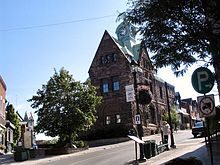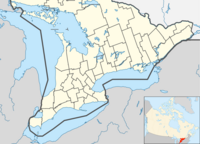Mississippi Mills, Ontario
Mississippi Mills | |
|---|---|
| Town of Mississippi Mills | |
 Pakenham | |
 Mississippi Mills within Lanark County. | |
| Coordinates: 45°13′N 76°12′W / 45.217°N 76.200°W | |
| Country | Canada |
| Province | Ontario |
| County | Lanark |
| Settled | 1810s |
| Formed | January 1, 1998 |
| Government | |
| • Type | Town |
| • Mayor | Christa Lowry |
| • Governing Body | Mississippi Mills Town Council |
| • MP | Scott Reid (CPC) |
| • MPP | John Jordan (PCO) |
| Area | |
• Total | 519.58 km2 (200.61 sq mi) |
| Population (2016)[1] | |
• Total | 13,163 |
| • Density | 25.3/km2 (66/sq mi) |
| Time zone | UTC−05:00 (EST) |
| • Summer (DST) | UTC−04:00 (EDT) |
| Postal code FSA | K0A |
| Area code | 613 |
| Website | www.mississippimills.ca |
Mississippi Mills is a town in eastern Ontario, Canada, in Lanark County on the Mississippi River. It is made up of the former Townships of Ramsay and Pakenham, as well as the Town of Almonte. It is partly located within Canada's National Capital Region.
History
The Town of Mississippi Mills was incorporated on January 1, 1998, by amalgamating the town of Almonte with the townships of Ramsay and Pakenham.
Communities
The town comprises the communities of Almonte, Appleton, Bennies Corners, Blakeney, Cedar Hill, Clayton, Galbraith, McCrearys, Montgomery Park, Pakenham, Ramsay, Snedden, The Tannery, Uneeda, and Union Hall. The town administrative offices are located in Ramsay and Almonte.
Many of the communities in Mississippi Mills were settled along the shores of the Mississippi River where the natural falls provided an opportunity to harness the water power to operate the mills.
Almonte
Settled in 1816, Almonte was one of the principal wool manufacturing towns of the Ottawa Valley. Formerly a separate municipality, the town located along the Mississippi River, has had many name changes: Shepherd's Falls, Shipman's Mills, Ramsayville, Waterford and then Almonte after a Mexican general.
Appleton
A former mill town, Appleton was settled in the 1820s along the Mississippi River in the former Ramsay Township. The town once included a sawmill, gristmill and a woolen mill.
Bennies Corners
Bennie’s Corners was a small village located at the junction of the eighth line of Ramsay and Bennies Corners Road, on land where James Bennie settled in 1821. Most of the hamlet was destroyed by fire in the summer of 1851, and when rebuilt it had little more than a post office and general store, a few residences, a school and some trades with a population of about fifty people. In 1874, the area post office was moved from Bennies Corners to Blakeney in 1874.
Blakeney
Located on the Blakeney Road, the community was first settled in 1821 at rapids along the Mississippi River. It was originally known as Norway Pine Falls, Snedden’s Mills and Rosebank, before being formally named Blakeney in 1865.
Cedar Hill
The village of Cedar Hill was first called Upper Pakenham and was built around the first school and once had a small population with two sawmills, two churches and a school. The village is located at the intersection of Cedar Hill Side Road and the 7th Concession in the former Pakenham Township.
Clayton
Founded by Edward Bellamy in 1824, it was first named Bellamy’s Mills, Clifton and then finally named Clayton in 1858 for postal reasons. The hamlet is located at the intersection of Tatlock Road and Bellamy Mills Road, on the shore of Clayton Lake, a local recreational area.
Galbraith
The area of Galbraith is located at Rae Road and Concession 5 in the former Ramsay Township. It was named after Daniel Galbraith, a Member of the Provincial Parliament, and later Member of Parliament, who owned the surrounding land which he had purchased in 1855. The one room Galbraith School, S.S. No. 5 Ramsay, was on a half acre of land at the top of the hill, which Mr. Galbraith had sold to the school trustees in 1870 for $1.00. He also gave land for a second school in 1875 on the opposite side of the road. The school operated until 1969 when the Government of Ontario mandated the consolidation of county schools and bussed students to either Almonte or Carleton Place.
McCrearys
Among the first settlers of the area was the McCreary family in 1823. McCrearys was located on Concession 3, Lot 3 in the former Ramsay Township. Joseph McCreary gave the land for the first school, on which "McCreary School" was erected. This one was torn down and a new one was erected in 1871. The community was known for the McCreary Cheese Factory, located on the road south of Highway 7.
Montgomery Park
Located along the Montgomery Park Road next to the Mississippi River.
Pakenham
Pakenham, formally established in 1823, is known for the nearby Mount Pakenham, a popular skiing location, and the five-arch stone bridge crossing the Mississippi River. Built in 1901, it is the only five-arch stone bridge in North America. The community itself is named for a brother-in-law to the Duke of Wellington, Major-General Sir Edward Pakenham, who was killed near the Mississippi River in the southern United States commanding British forces at the Battle of New Orleans in 1815.
Ramsay
Snedden
The Tannery
Uneeda
Union Hall
Demographics
| Year | Pop. | ±% |
|---|---|---|
| 1871 | 2,080 | — |
| 1901 | 3,023 | +45.3% |
| 1911 | 2,452 | −18.9% |
| 1921 | 2,426 | −1.1% |
| 1931 | 2,415 | −0.5% |
| 1941 | 2,543 | +5.3% |
| 1951 | 2,672 | +5.1% |
| 1961 | 3,267 | +22.3% |
| 1971 | 3,696 | +13.1% |
| 1981 | 3,855 | +4.3% |
| 1991 | 4,382 | +13.7% |
| 2006 | 4,528 | +3.3% |
| 2011 | 4,752 | +4.9% |
In the 2021 Census of Population conducted by Statistics Canada, Mississippi Mills had a population of 14,740 living in 6,043 of its 6,241 total private dwellings, a change of 12% from its 2016 population of 13,163. With a land area of 511.25 km2 (197.39 sq mi), it had a population density of 28.8/km2 (74.7/sq mi) in 2021.[4]
| 2021 | 2016 | 2011 | |
|---|---|---|---|
| Population | 14,740 (+12.0% from 2016) | 13,163 (+6.3% from 2011) | 12,385 (5.5% from 2006) |
| Land area | 511.25 km2 (197.39 sq mi) | 519.58 km2 (200.61 sq mi) | 519.53 km2 (200.59 sq mi) |
| Population density | 28.8/km2 (75/sq mi) | 25.3/km2 (66/sq mi) | 23.8/km2 (62/sq mi) |
| Median age | 50.0 (M: 48.0, F: 51.6) | 47.9 (M: 47.0, F: 49.1) | |
| Private dwellings | 6,241 (total) 6,043 (occupied) | 5,536 (total) | 5,037 (total) |
| Median household income | $100,000 | $84,173 |
Culture

Mississippi Mills is home to several festivals and events, including the North Lanark Highland Games, Naismith 3-on-3 Basketball Festival, the Almonte Fair and CeltFest.
Many of the town's citizens commute to the nearby city of Ottawa. Almonte has three elementary schools: R. Tait McKenzie Public School, Naismith Memorial Public School and Holy Name of Mary Catholic School. Almonte and District High School serves the town of Almonte and much of the surrounding area.
See also
References
- ^ a b c "Census Profile, 2016 Census: Mississippi Mills, Town". Statistics Canada. 2017-02-08. Retrieved June 19, 2019.
- ^ Statistics Canada: 1996, 2001, 2006 census
- ^ "Mississippi Mills census profile". 2011 Census of Population. Statistics Canada. 2012-02-08. Archived from the original on 2017-11-08. Retrieved 2012-02-15.
- ^ "Population and dwelling counts: Canada, provinces and territories, census divisions and census subdivisions (municipalities), Ontario". Statistics Canada. February 9, 2022. Retrieved March 30, 2022.
- ^ "2021 Community Profiles". 2021 Canadian census. Statistics Canada. February 4, 2022. Retrieved 2023-10-19.
- ^ "2016 Community Profiles". 2016 Canadian census. Statistics Canada. August 12, 2021. Retrieved 2019-06-19.
- ^ "2011 Community Profiles". 2011 Canadian census. Statistics Canada. March 21, 2019. Retrieved 2012-02-15.
- ^ "2006 Community Profiles". 2006 Canadian census. Statistics Canada. August 20, 2019.
- ^ "2001 Community Profiles". 2001 Canadian census. Statistics Canada. July 18, 2021.

